- From Faith Current: “The Sacred Ordinary: St. Peter’s Church Hall” - May 1, 2023
- A brief (?) hiatus - April 22, 2023
- Something Happened - March 6, 2023
Hello there Nancy (and everybody)—
Mike here. Nice post, Nancy; thanks. Here are some more thoughts spurred by The Atlantic’s Joshua Wolf Shenk on Lennon and McCartney, perhaps too many.

“I read The Atlantic, mmkay?”
First of all, Shenk’s piece struck me as typical magazine journalism in the post-Gladwell age — well-written and not factually wrong, but persistently unambitious, only revelatory to somebody who hasn’t really thought about anything but TPS reports since the late 1990s.
You know the drill: writer declares something to be conventional wisdom — Shenk even goes to Wikipedia for it — then demolishes it via a catchphrased Big Idea. In this case, the author’s whole premise can be distilled into a single ProTip: Collaboration can lead to great results!
This isn’t Shenk’s fault; he’s only supplying what book and magazine editors crave. We have a generation or more of people working in New York chasing zeitgeist when that idea is pretty much obsolete. Conventional wisdom requires a strong cultural center, a set of shared values and references which we haven’t really had for decades. So we’re left with content like this, basically TED talks in prose. “Let me show you how ‘the power of pairs’ is transforming our shared reality!”
What Do You Mean ‘We’, Kemosabe?
Only when we explore [how competition and collaboration are intertwined] can we grasp how such pairs as Steve Jobs and Steve Wozniak, William and Dorothy Wordsworth, and Martin Luther King Jr. and Ralph Abernathy all managed to do such creative work. The essence of their achievements, it turns out, was relational. If that seems far-fetched, it’s because our cultural obsession with the individual has obscured the power of the creative pair.
Translated: usually magazines like The Atlantic make a big deal out of individuals, but that’s often a misleading simplification of how things really get done. So now it’s all about pairs. Until it’s all about groups. And then it’ll be back to individuals again. People gotta read books on planes, you know.
Shenk isn’t wrong-wrong — as he notes, back in the 80s and early 90s, many people believed that John and Paul didn’t collaborate much after the early days. But he misses what’s really interesting about this: although this opinion wasn’t borne out even by what we knew then, people believed it solely because John Lennon the Slain Truthteller had said it in an interview. The role of grief and collective guilt in the shaping of a historical narrative is much more interesting (and perhaps more revealing of what people think about John, Paul, and John and Paul) than what this piece is about.
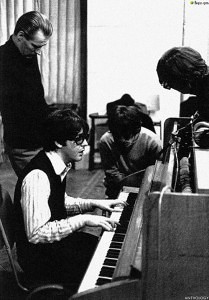
All together at the piano for Revolver, 1966.
John and Paul and George and Ringo and George and Norman and…
John and Paul is the typical take on Hey Dullblog, and it’s been that way since 2008 when we started, not because we’re so smart, but because anybody who really examines the Beatles’ working methods sees immediately that they were based on collaboration — and not just between John and Paul, either. Shenk finesses this as “external support,” because it blows up his pairs-premise, but in the case of the Beatles, the masses of helpers were essential — more essential than either John or Paul ever admitted. The solo stuff is there to be heard, and the verdict is obvious: It’s the whole Beatle family that made the magic.
Take for example, the song “Tomorrow Never Knows”; a more ur-John tune would be difficult to imagine, and everything about its genesis suggests that Lennon was driving the process—from his insistence that they start the Revolver sessions off with TNK, to the vague ideas passed on to the studio team (“a hundred lamas chanting” or whatever it was), which the studio team actually pulled off. But just last month, when I was doing the post on The Beatles and the Dalai Lama, I discovered that the tape loops in TNK – second only to Ringo’s drumming in the sonic landscape of the song — came from Paul.
This ceases to surprise, after the first decade or so of reasonably engaged fandom. The intense fans — people who actually give a shit about getting the topic right — usually end up seeing the group as the group themselves often described it: best idea won. Here’s Ringo in 1966: “The best thing about this group is that we all work everything out between us. It doesn’t matter who is playing what. If someone thinks of something, then we’ll try it. If I’m playing the drums and someone says, ‘Try this here, or do something there,’ I’ll try it. The same with John on guitar… it’s the same with all of us.”
So it’s the democracy — many brains working on one problem — that makes for the genius. In other words, the same principles behind every great TV show, movie, or The Onion. That many guys that smart, working together, SHOULD make great rock music. And when the product wasn’t as good, it was because their egos wouldn’t let them use the process that they knew worked best.
Pepper vs. White
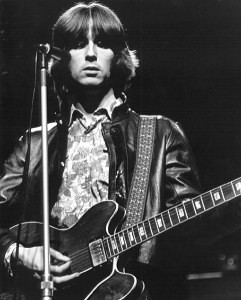
Eric Clapton, Fall 1968.
This section of Shenk’s piece is loaded with commonplaces, and what’s more I think gets something really wrong, which you pointed out in your earlier post: White’s patches of excellence — and my conflicted-verging-on-negative feelings on that double-set are widely known and needn’t be repeated here — come not from the tension of the famously fractious sessions, but from the months of close contact (practically forced collaboration, the closeness of touring without the fans or distractions) in India. And for me, White’s highpoint, Harrison’s “While My Guitar Gently Weeps,” is yet more collaboration: the famous addition of Clapton, which not only gives the song transfixing lead guitar, but also whipped Lennon into shape. For that session at least he wasn’t “psychotic.”
Shenk talks about Pepper being passive John — then goes on to describe a bunch of collaboration: “when John and Paul together shaped every song on the album.” Then he talks about White as being John “dominant”; continuing John’s insinuation that Pepper was somehow inauthentic, less Beatles, and White more, and if you’re a John fan — that is, if you want real art, real honesty, real genius — White’s the real thing, whereas Pepper’s not.
This is bullshit. John may well have felt that way, at times, in public, when he was trying to sell his latest solo album, but we shouldn’t be fooled. I think it falls into the post-Yoko Lennon Remembers idea of collaboration with McCartney as being somehow beneath John, the pain-riddled genius John deigning to associate with a mere tunesmith, a dilution of his vision…which is simply not borne out by the historical record. “Help!”, “Tomorrow Never Knows,” “SFF,” “Day in the Life,” “All You Need is Love” — these are the iconic Lennon songs, not his material on White. To some degree, White is the product not of the Beatles’ tried-and-true democratic working method — the stuff that produced, year after year, what we remember them for — but of a post-Beatles, auteurist vision that has much more to do with the high art world than the one of rock and roll, a vision was largely unsuccessful for Lennon, and even when successful, produced material with the same flaws one often finds in high art (narcissism, faddishness, navel-gazing, cynicism…) Let It Be, the Beatles least successful album, is even worse.
And that’s where Yoko comes in. Whatever else she may be, “open to other people’s ideas” is not high on the list. “Yoko thinks of men as assistants,” John once said admiringly, though why this is a positive trait was never explained. After her arrival, Lennon rejected collaboration in favor of alternating dominance and submission. For this he paid a terrible creative price and grew resentful towards, strangely, Paul — the person who wanted nothing more than to collaborate with him, like they used to.
“The Way We Used to Do It”
Even after the dysfunctional sessions of White and Let It Be, with Apple, Klein and smack all taking their toll, all it took was a return to the old method to produce Abbey Road — an LP as good as any they ever did. That’s how powerful the method was. The Beatles working method seems to be have been pretty consistent, and their greatest work comes out of group-mind, openness and collaborative security. Their method only really changed in one period — May ’68 to February ’69. Unfortunately, that period was exhaustively documented; the Let It Be sessions are the only sessions we have on film. This distorts the picture most casual fans take away. It’s absolutely essential to remember that the discordant period — late White, and Let it Be — was considered by insiders to be an anomaly, not at all like Pepper had been made, or Revolver, or Rubber Soul.
This is also the period that was highlighted by John Lennon in innumerable interviews — where he insists that the work of the collaborative period was crap, and the work in his auteurist phase the only stuff worth keeping. This is the same peculiar mix of paranoia, ego, and anger (at whom, the fans? Paul? Himself?) in which he detailed who wrote what to an almost Nixonian level of obsession. If the divvying up of Beatlesongs parsing is ludicrous (and it is), it was the natural endpoint of Lennon’s Playboy interview of September 1980, where he pretends to be oh-so-bored with rehashing the past, then spends hundreds of words talking about who wrote, for example, the middle-eight to “With a Little Help From My Friends.” As you said, Nancy, Shenk’s recognition of their collaboration is more accurate than the Lennon Version. It is a step forward.
Another, more thinky idea for an article would be: what does the idea of individual genius do to the artists who accept it? For the first — and by far the most tragic — victim of the single-genius-of-the-Beatles idea was John Lennon. Yoko, for reasons only she knew, constantly reinforced this curdling “you’re the genius” idea in John’s mind. Which simply didn’t work for him, practically speaking. Lennon becomes less and less productive after declaring himself a genius in Lennon Remembers, and finally runs dry in 1975. When he reemerges, there’s no more talk of genius, in fact the opposite: he’s a househusband, singing about his life, and if you dig it, you dig it. If not, not. One of the things we lost when John died was an opportunity to see if this humility was real, and if — as seemed to be the case — his muse depended on it.
John and Paul were not opposites
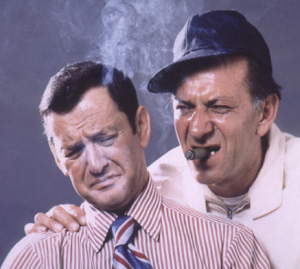
Felix and Oscar
The idea of John and Paul as the Odd Couple — while too oft-repeated not to have a grain of truth — is not nearly as interesting as how the two frequently switched polarities. Emerick’s neatnik could ad lib “the movement you need is on your shoulder,” while Lennon could and did work on songs for years before getting it right (eg, “Child of Nature”/”Jealous Guy”).
There’s simply too much image in the simple yin-yang theory for it to be accurate. Once again, dedicated fans find too many outlying data points — it was Lennon, not McCartney, who settled down in the stockbroker belt; it was McCartney, not Lennon, who spent the mid-60s immersed in the avant garde. It was Lennon, not McCartney, whose world shrank to focus on romantic love; it was McCartney, not Lennon, who successfully worked with his wife as a musical collaborator. Yet Shenk says, “The work John initiated tended to be sour and weary, whereas Paul’s tended to the bright and naive.”
Right, like “Julia”…and “Helter Skelter”?
Shenk commits the casual fan’s sin of taking John and Paul’s public images to be who they really were. “Help!” is sour and weary; “All You Need Is Love” is not. “Yesterday” is not bright and naïve. Both guys were complex; reducing their chemistry to the parts of “We Can Work It Out” or “Getting Better”—is too pat. What you gain in neatness, you lose in accuracy, and fifty years on, accuracy counts.
Forget the public image — especially after Lennon got weird and defensive about Paul. The key is that John and Paul harmonized; to obsess over the distinct qualities of each voice is to ignore what is so notable: the incredible, unlikely, incomparable “third thing,” created by the pair blending together.
Brothers
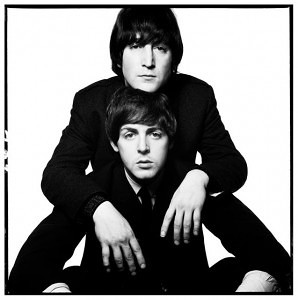
Two heads are better than one, 1965.
Shenk’s essay is saved by this main emphasis on collaboration, which is accurate and I suppose salutary (even if anyone interested in the topic would know it already). But it would’ve been a better, more surprising, perhaps even bracing essay if it had emphasized the many, much more determinative ways that Paul and John were the same. If they really were so different, they wouldn’t have come together in the first place, nor collaborated so brilliantly. It’s their fundamental sameness that makes us — and themselves — so determined to differentiate the one from the other.
They both grew up in Liverpool at the same time, listening to the same music, and liking the same artists. They both idolized America, and the same things about it. They both lost their mothers, suddenly, as teens. They were both fiercely intelligent, fiercely ambitious, and fiercely determined. They both saw rock and roll, of all things, as their ticket to a better life. They both wanted to write songs, decided they could, and did. They both had excellent, utterly distinctive voices. They saw and appreciated each other’s talent. They both had the ego to be a frontman, but the good sense and humility to collaborate with the other. They both spoke the same musical language — and clearly didn’t realize how rare that was, until they split and couldn’t find anybody else to talk to.
None of these concordances were inevitable, and all of them were hugely important, determining everything that happened after. To gloss over all of this – to take it for granted – to refuse to see it for the miracle it was — is its own kind of conventional wisdom and, to my mind, long overdue for a smackdown. — Mike G, writing too much, too late at night, with really dry contacts.

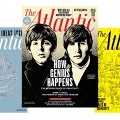
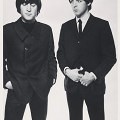

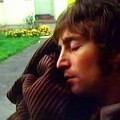
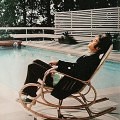
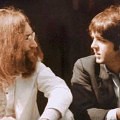
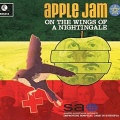
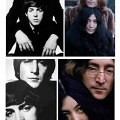
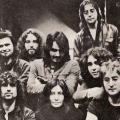

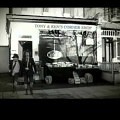

I’m convinced The Beatles should have followed The Doors’ philosophy of crediting the authorship of all songs to the members of the group. George’s contributions to Lennon-McCartney songs are legion; take “I Saw Her Standing There” as an example. Paul’s lyrics are simple, and there are only three chords in the song. Now go to YouTube, search Beatles Guitar Secrets I Saw Her Standing There, and listen to George’s guitar fills and solo brought to the forefront of the song. George’s parts make the song what it is.
Wow, that’s marvelous, @JR. Thanks! Click it everybody, you won’t be disappointed.
http://youtu.be/LIjaOmd6UPs
Just to say that is the way I also “feel” Lennon/ MacCartney. And also that I also feel all them together gave us those magical sounds. They were a quartet with the same importance.
[…] can read take 1 here, take 2 here, and take 3 here. Add your own take in the […]